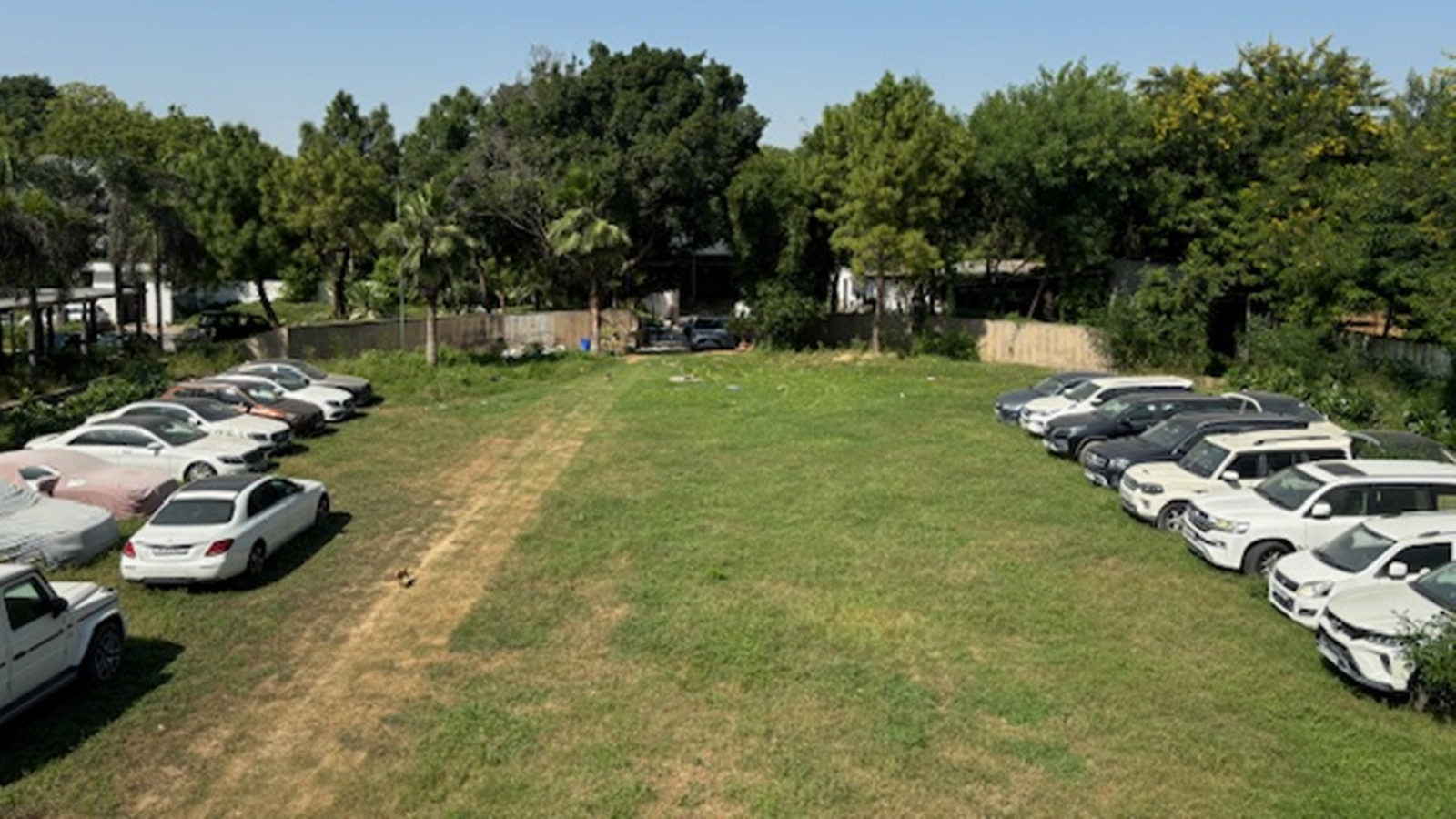The façade of the farmhouse has a big “ED” painted on it, with the “D” fast fading. The indoor swimming pool is empty, the space used as a waste yard for discarded sarkari furniture; there is even a twin lock-up and interrogation centre inside. A family of strays, with a litter of puppies, has free run of the 2.5-acre property, fed by staff near the “canteen” which was once a plush kitchen.
A visit shows that, including casual employees, there is a staff of almost 100 working inside. The sprawling central lawn of the farmhouse, with a market rate estimated by local property dealers to be worth Rs 120 crore, lined with fir trees and silver palm, serves as a parking lot for seized cars. There were about 40 cars on Thursday, some priced at Rs 1 crore plus.
Story continues below this ad
 Seized cars lined up at ED’s Rajokri farmhouse office. (Express photo by Ritu Sarin)
Seized cars lined up at ED’s Rajokri farmhouse office. (Express photo by Ritu Sarin)
Officers say when ED headquarters in New Delhi is short of space for parking pricey cars confiscated as proceeds of crime, they line them up at this sprawling ED “office” in Rajokri. Besides a yard for seized cars, one large living room also doubles up as the agency’s training centre by the ED.
This very farmhouse has been the subject of ample litigation, earlier in the Debt Recovery Tribunal (DRT) and the Delhi High Court and, at present, in the Prevention of Money Laundering Act (PMLA) court in Panchkula, where the Union Bank of India (earlier Corporation Bank) has challenged the ED’s attachment and confiscation of the property as a “proceed of crime.”
Reason: the farmhouse belonged to Atul Bansal, a realtor, alleged to be the main accused in a property and money laundering case, and has since passed away.
He had purchased the property in 2004 and, it was in 2012, that he mortgaged it, along with other assets, with a consortium of banks for a sum of Rs 111 crore.
Story continues below this ad
The Rajokri farmhouse was mortgaged with Union Bank of India by Wisdom Realtors, a company of Atul Bansal, and after default, the bank took possession of the property in 2017.
 The indoor swimming pool area now a dump yard for discarded sarkari furniture. (Express photo by Ritu Sarin)
The indoor swimming pool area now a dump yard for discarded sarkari furniture. (Express photo by Ritu Sarin)
It was Wisdom Realtors which challenged the possession in the DRT and obtained a stay order, which the bank again appealed against in Debt Recovery Appellate Tribunal (DRAT).
A reading of the 2019 DRAT order shows that at that stage, Wisdom Realtors had given a “settlement proposal to the Bank for Rs 96 crores odd for which amount there was a buyer ready to buy the property” but the sale eventually did not happen.
Lawyers appearing for the Union Bank in Panchkula said that it was in 2019, again, that they learnt that it was the ED that had first attached and later confiscated the property which had been mortgaged with them.
Story continues below this ad
That order of confiscation and its confirmation, too, has been challenged by the Bank.
When contacted, Union Bank of India’s lawyer Alok Kumar explained why the ED’s confiscation and subsequent usage of the Rajokri property was being challenged by the Bank. “The purpose of attachment or confiscation (by ED) is to realize the dues for the Government exchequer. If the purpose is defeated by the fact that despite attachment or confiscation, the ED has neither handed over the property to the Bank nor auctioned it to realize public money, at the end of the day, the property has become NPA (Non Performing Asset). By opening an office inside, that very purpose of PMLA is defeated.”
 Two lock-ups for pmla accused inside the rajokri farmhouse building. (Express photo by Ritu Sarin)
Two lock-ups for pmla accused inside the rajokri farmhouse building. (Express photo by Ritu Sarin)
According to top officials of ED in New Delhi, the Rajokri property was among three such confiscated properties in which the investigating agency was running “establishments.”
The other two were in Ranchi and Mumbai where there may be no challenge from Banks as in the case of the Rajokri property.
Story continues below this ad
The officials said that under provisions of Section 9 of the PMLA, such “confiscated properties” remain “vested with the Central Government” and that it was a Gazette notification of the Ministry of Finance dated September 12, 2023 that gave powers to Special Directors of the ED to act as “Administrators” to “receive, manage and dispose the property confiscated…”
Said a top official: “While the notification does not state that the ED can use the confiscated properties as offices, the properties can be used and managed as the Department wants. We are, simply, using this farmhouse, for example, till the time of disposal of the property comes.”
Inside the Rajokri farmhouse, officers and staff have occupied the once private bedrooms, living rooms and walk-in closets as converted office spaces. They said “maintenance” of the place is a daunting task. Said a senior official working in farmhouse: “Ideally, the ED should have its Gurugram zonal office in Gurugram itself and if we do get alternative space, maybe the farmhouse will be used by the ED as a training centre in future. By using the property as its zonal office, at least the farmhouse is being maintained and not being allowed to go into disrepair.”



 Seized cars lined up at ED’s Rajokri farmhouse office. (Express photo by Ritu Sarin)
Seized cars lined up at ED’s Rajokri farmhouse office. (Express photo by Ritu Sarin) The indoor swimming pool area now a dump yard for discarded sarkari furniture. (Express photo by Ritu Sarin)
The indoor swimming pool area now a dump yard for discarded sarkari furniture. (Express photo by Ritu Sarin) Two lock-ups for pmla accused inside the rajokri farmhouse building. (Express photo by Ritu Sarin)
Two lock-ups for pmla accused inside the rajokri farmhouse building. (Express photo by Ritu Sarin)





